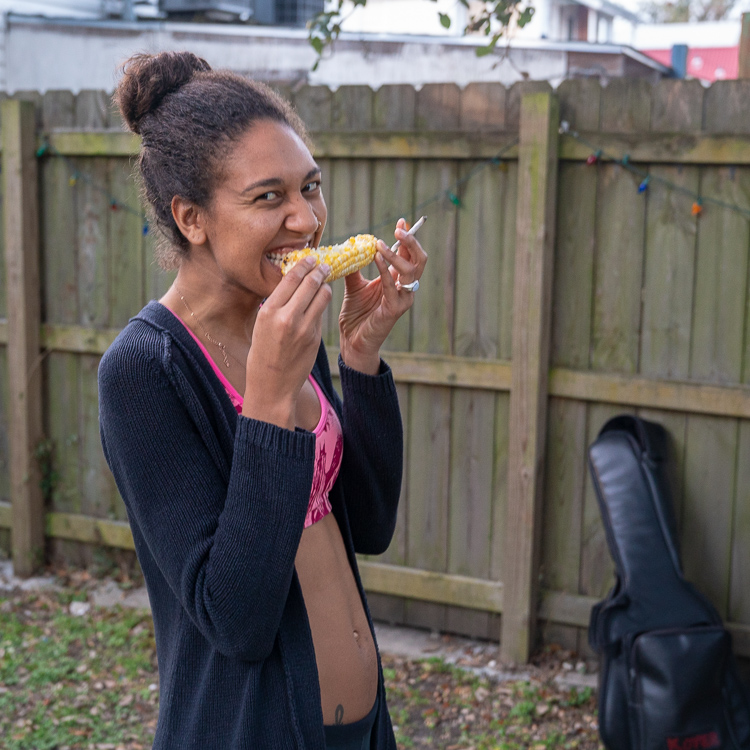
The vibrant New Orleans culture attracts creative people from all over the world. Sometimes they stay permanently, and sometimes they only stay for a time, but maintain ties to the city. Diane Ghogomu is such a creative person. She had been traveling widely before coming to New Orleans; she lived in the city for a while and then continued her travels, but maintains her ties to New Orleans. My project is about New Orleans neighborhoods, and people like Diane, even if they don't stay permanently, have a major impact in shaping the city's neighborhoods and culture. |
![]()
Diane: So I'm used to getting to a town and having to do this in a month and then moving to another town. It's like "Oh this is easy I get to be here for a long time." So this [interview] is actually a really great activity now, because this is almost like a therapeutic process, because I've lived really an intense, fast-paced life for many, many, many years. And I'm settling down again. And so New Orleans, where I just moved in August, is the first time I've settled in a space in four years. So previously, the past 10 years of my life has been spent almost 10 in South America. I moved initially to Argentina to do... I had Fulbright to do anthropological research with the Afro-Argentinian community. And eventually, after that, I always knew that eventually I would move to Brazil. And after six years, I was like, "Okay, we've had enough for Argentina." I was way too close to all the subjects because I'm an activist anthropologist. I was way too intertwined with everything I was doing, things were getting really emotional, really, really intense all the time. And I thought, "Okay, that's it. Like, it's time for me to choose work in other places." Because there's a lot to be done with Argentines, There's a lot of research that needs to be done. But Argentina was never going to be the place that I could settle myself. It's always a place where I'm an Other. It's always a place where I'm asked why I'm here and what I'm doing. It's always a place where I'm identified as an outsider, no matter how well I speak the language, no matter how much I know. That is the national imagery of Argentina. Q: Why do you think that's true in Argentina? Diane: In Argentina, that's true just because they basically have a national identity that's based upon Whiteness. It's very constructed. Euro-Whiteness. So if you ask an Argentine about their identity, regardless of whether they might have African descendants, they will tell you about their grandmother from Italy. They'll tell you about their how their family came from Spain, and they might be darker than I am. But in Argentina, because there was a literal erasure of Afro Argentine history and of Argentine pride, Blackness is something that is completely detached from the Argentine identity. So for me as a Black woman, as a tall Black woman, who is very outgoing and is very outspoken, I speak perfect Spanish, It's like, I caught a lot of attention, because… there's an exoticization of people of color in Argentina, where Black women are sexualized, and Brazilians are sexualized, which means they think all Black people are Brazilian. |
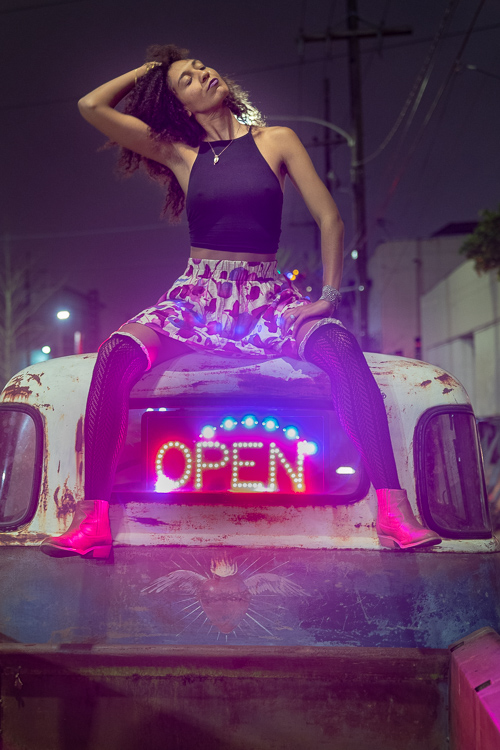
So it was a space where though I created communities, and that's always part of what I do, I'm a community builder and I build spaces where people feel that they can commune in peace. And I would always, as soon as I walked out of the door of whatever space or event that I was in, it would be a "Oh, where are you from?" So, there would constantly be this idea that you're not from here. You're never going to be from here. And I like to live in spaces with a consciousness. Those who have consciousness of their history of those who have consciousness of their spirituality, and Argentina, in general because of that erasure... because if you're erasing your indigenous and your African population, you're erasing so much of your identity. You're only using one of your pillars, and that other particular pillar is also very Catholic. And so that just led to a lot of conservative Catholic ideals of what is identity of what is family and I live outside of that spectrum. So I was sent to Brazil when I first got to Argentina with my Fulbright. That was 2010. It was the first time I'd ever been to Brazil. This was about nine years ago. And I said, "Okay, when I come back to this place, I'm going to live here, once I'm done with my mission in Argentina." There was no doubt in my mind. And that's what I did. And I realized that my mission in Argentina, though I thought it was way more academic, it was really way more spiritual. |
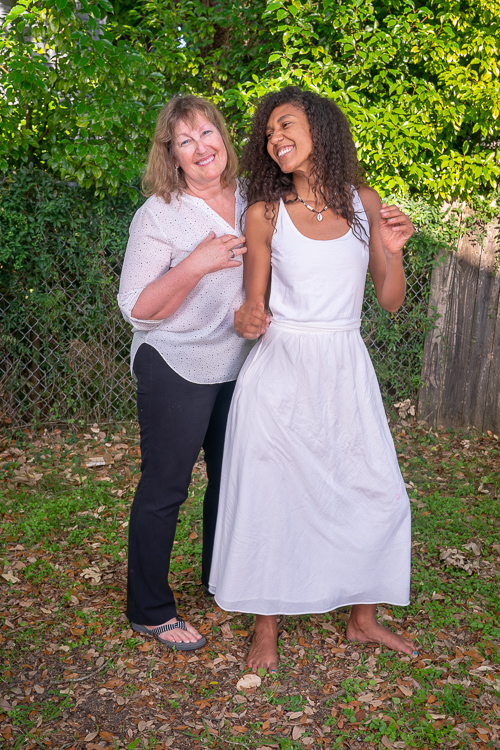
And a way for me after graduating from Harvard, I come from a family that's about work. My dad's a teacher, my mom was a secretary manager. They're very much middle class like, "You do this. You work." My dad's an immigrant. So it's like, you work, you make money. You have a family, that's what you're supposed to do. And then, once I was at Harvard, you know, for my family, it was just like, wow, nobody ever thought about those things. It wasn't like Harvard. It was like "Yeah, you're going to go to college." But once I got in all of the Ivy Leagues it was just like, "Okay, this is different now. Now you're going to do us well, you're going to do us proud." And so once I left, and I started living a different type of life, which was in South America, completely integrated with the communities that I was working with, I didn't go back. I started teaching yoga, I started working in other aspects of my life, studying Chinese medicine, teaching yoga, singing. My family freaked out a little bit. As parents want the best, they want you to do what's best. And all of my spiritual searching that I was trying to find. |
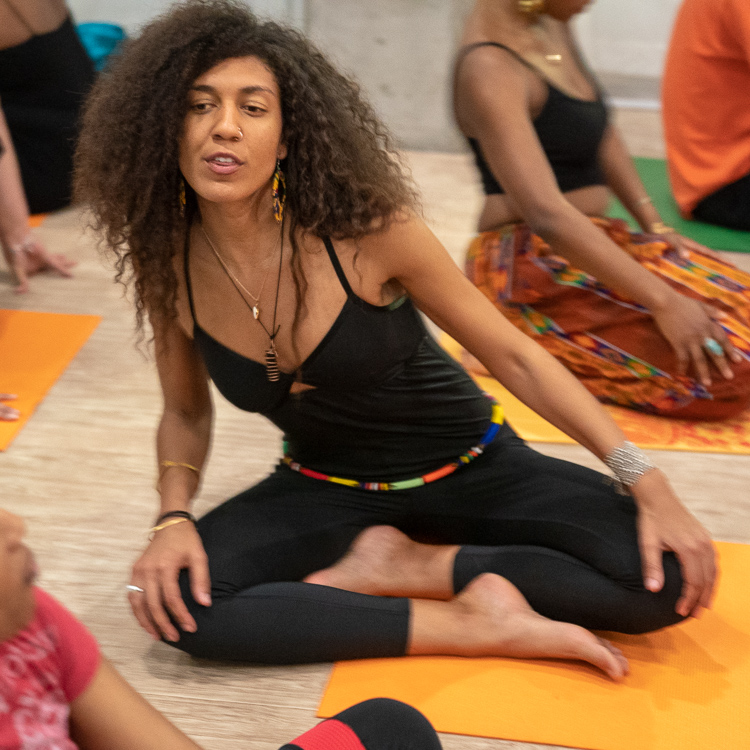
"Okay, I know I can do school. I know I can work well. I know I can get hired wherever I want. But I don't want that. So what is it that I want?" And that was most of living in Argentina, you know, you go to a new place and you are able to realize that your identity is so contextual, your identity is constructed. So you can choose now, "Well before people expected me to be this type of person. Now I don't have any expectations" other than the structural hegemonic identity expectations that people have of when they see any human being. So Argentina for me, was really the process of me rebuilding myself, and I am I'm a very spiritual person. And that to me just means that I have faith in the forces that are more intelligent than I am. Those being nature, those being divine forces and that those forces are consistently communicating with us and convening and part of us. So that was just my time, those six years in Argentina to really develop those intuitions again, really go back to me as a human rather than Diane this overachiever, Diane the Harvard grad, Diane the one who's going to make the family proud and who's going to be the one who does something great. And after doing that, I realized in Argentina, I was like, "Well, I've done everything. You know, I've worked as an educator, yoga teacher. I've done translation work, I made documentaries, I've directed study abroad programs, I created my own programs, directed those programs." I was like, "Well, shit, I can do anything I want. I don't want to do it here anymore." So I moved to Brazil. |
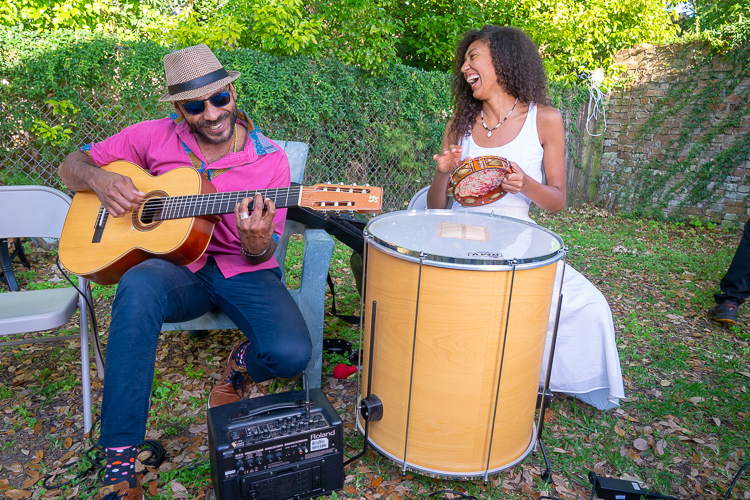
And basically the week before, or like the last few months that I was working in Buenos Aires, I knew I wanted to make a move. I was just finishing a documentary, like it had just come out. So I said okay, this is like a huge closing of the many years of research. Let's go. And so that half year before I left Buenos Aires when I knew I was going to leave, a friend brought me to a Brazilian girl's house because most of my friends in Argentina were Brazilian. So I was already fluent in Portuguese by the time I got there. And I said, "Where do you live?" She says I live in Bahia. I said, I'm gonna live there someday. I live in Salvador. I said, I'm gonna go there. And I'm going to live there. And she said, "Okay. When you do that, make sure you call me, you can come to my house." And literally, even before I wrote to her, we had a few more meetings and we played some music, you know, we connected on other levels. And then, before I had even moved, she sent me a message with a photo of the sea. And she said, "I found a house. You're welcome here." So maybe three, four months later. I sold all my stuff, you know, said, ciao to that life. And I just left and I went to her house. And I really didn't know what was going to happen at all. I didn't know where I would go after that or what I would work on or what I would do. But at that time, I had a consulting job online. I was consulting for a nonprofit in Pittsburgh. And I was also building a program for a funder who wanted to build his own nonprofit. So I was building his nonprofit as a consultant. And so I was cool, right? I had streams of income coming in, I would work from home, and I would just go explore. I lived with my friend Juliana for that month. I rented out a little room in her house with the view of the beach. I would sleep in a hammock and listen to the beach. And after that, I basically began to live between Brazil, United States and Argentina. So I would work intermittently. Anytime I'd go back to Pittsburgh, I would work on consulting. So I'd go back to the nonprofit that I consulted for remotely, I'd go work in their offices, take photos, rewrite bios do other like copy editing, right. I did their website and then, we also had another grant as well in Argentina for my second documentary that I'm finishing now about Afro-Argentines. And so I would just rotate about every three or four months, I'd spend a few months... I spend the least time in the United States usually, usually fly through New York, work a little bit in New York, go back to Pittsburgh to my consulting, fly to Brazil, and then I would go to Argentina. And so eventually, what also happened that brought me back to New Orleans. |
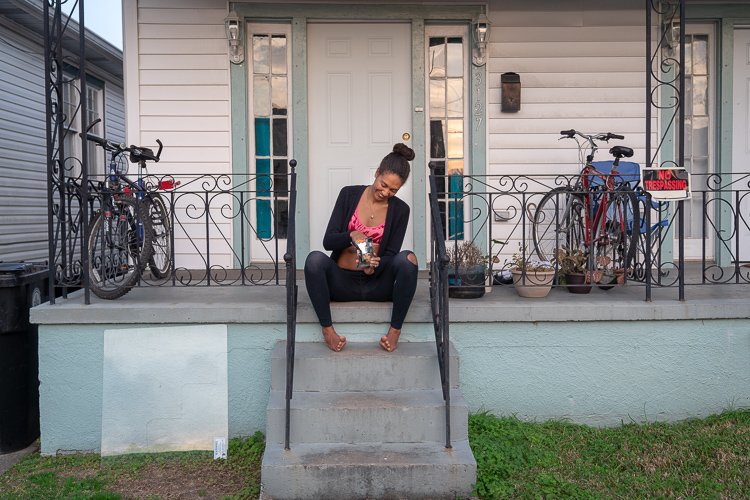
I initially came to New Orleans for the first time because my last year in Argentina, I was invited to give a presentation at a conference about Afro Argentines and about my documentary. At this time I still really didn't think I would come back to United States ever. I figured I would do my higher education in Brazil and stay in Brazil for the rest of my life. And once I got here to New Orleans, I also met another lover who came down to meet me. And I subsequently did not fall in love with this lover but I fell in love with the city. And I reconnected with a different old lover that I had from college, during his residency or maybe he's doing his residency now. Medical School is so difficult to understand, but he was here. He's a surgeon. And he was schooling here as a surgeon at Tulane. So I went and visited Tulane and I would bike around the city and just look around and be like, "Wow, you know, this place is pretty cool." This place is not like the United States, not like Pittsburgh, not even California because I like California, but it's so expensive and it's so cliquey. And I was like New Orleans, I like this place. Everybody's weird, you know, I fit in. And so, by the end of our trip, we were kind of like, all right, well, I live in Argentina. You know, I don't want to be in a relationship right now in a traditional sense, but like, let's see what happens. Let's meet each other places. I'll apply for grad school at Tulane in New Orleans, and then we'll see where that goes. So we would meet each other in different places. And he would come here and eventually I spent a few months here in one of my trips to the US, just to live and see what I thought, to see if I like the city actually. And I did. And so I was like, all right, I can do this. So I literally I applied to one program. I applied to Tulane. That's it. It was like either Tulane or Brazil again. And I spent the time I was in Salvador studying for my GRE, preparing, writing the applications. And I had an artist residency there at the time. I would just produce events for this guy with this mansion and I would teach yoga there and he allowed me to stay there for free. |

And, I went to play a show with my, who I call my Maestro. We all call him Maestro, which literally means teacher, right? Because he's brilliant. And we worked on a project together in Buenos Aires, so we'd always see each other. And I went to go sing with them one night, and I'd been working all day on my documentary. We'd go out and film during the days and then some nights I'd go out and sing. And this night I went to go sing. And this guy walks in. And I had never ever dated an Argentine person ever. Six years back to 'Tina, never, never no good especially in Buenos Aires. And mostly because of how their ideas of Blackness and their ideas, I was a thing to them. I was an object, there was this constant "Othering" and I said, "I can't be intimate with somebody who doesn't see me as a real human being." That day I went and I saw this guy walk in. And you know, he had long hair, dressed all with a little button-up, comes in with his guitar and like jumps into the circle that we're playing in. I'm like, "Who's this person jumping into another band?" I don't recognize this person. I know all these people. And I look at my friend, I say, "who's that?" And I can already feel it in my gut. I was like, "This person is gonna change my life. I'm not sure how, but that's what's going on." And she was like, "Oh, that's, that's my friend." And I was like, "Oh, that's your friend. Well, he plays really well," and she was like, "yeah. And he lives in Brazil. But he's not Brazilian. He's Argentinian." But regardless, I think my first words were "I want to give you a hug," as usual. And that person was Salvador who I live with now. |

And so he was living in Rio at the time. I was going to go back to Salvador, which they're not very close. So I was like, Oh, cool. Salvador, the person who lives in my house, and the place, sorry, north of Brazil. No, it's very, it's confusing. It happens a lot. And so he was going back to Rio, where he lives as a musician, and I was going back to Salvador. And I was like cool. Well, my layover's in Rio anyways, I was going to be in Rio for a few days. Then I'll go to Salvador. And he was like "cool maybe I'll come to you in Salvador someday." Awesome. So I did that, went back to Bahia, went to Rio, we played lot of music, made a lot love. I went back to Bahia, kept doing the same thing. |

And that's when I began to study Tantra. In all of this, the guy who I was seeing here came to visit. And as I started studying Tantra, my vision of everything began to change. And so, I remember I wasn't really sure, I had just had this crisis. I was like, Do not mess with me. I had just had this crisis with my consulting job before I had started doing Tantra meditations every week, twice a week with this group who was doing them there. And I was teaching yoga and I was singing. And I had this really weird week where the guy who had made me build this program for him, kept saying he was going to pay me. He kept saying he had paid me, he had made one thing. And we're talking about a job where I was saying, I'm being paid as a consultant and I'm being paid well. And so this was not like chump change, right? I was like, Okay, So when's the next deposit so that I can send you the rest of the work? "Oh, I'm trying to make it. I'm trying to make this simultaneously the web designer," who had already designed our site as well kept saying the same thing. "Hey, your payments not going through. Hey, what's going on?" Right? Eventually, it got to a point where I had to call this person out. Now I'm like, "What is going on? Because you're messing with my life right now. Like, be honest about it. If there's something wrong, there's something wrong. You know, I've seen you, you're a person who lives large, so something's going on if you're not paying me." He was like, "There's this huge financial crisis in Argentina," and he did money in Argentina, American guy who did like financial stuff in Argentina. I don't know what really happened, whoever really knows, but basically he was like, "Look, I want to pay you, I just don't have the money to pay you and I owe a lot more people a lot more money than I owe you." So, I was suddenly faced with the fact that I didn't have a job. And I had done all this work. I had designed the program. My housing was free because I had this residency, but it wasn't really sure what was going to happen terms of my life. Then the person who gave me this artist residency basically, like, confessed that he was in love with me. And I was just pissed off at that. I'm just like, that's it's so inappropriate what you've done because now I'm questioning why I'm here. Am I here to work for you? Or am I here because you think I'm cute. Because if it's the latter, I'm leaving, I have another house that I could be in right now. So that weekend, I decided, there was this course, and the course was pretty expensive. It was a two day course, it was like six or seven hundred dollars, and in Brazil, that's mad expensive. And I was just like, yeah, I need to do this course. I'm gonna do it. I don't know where my next money is coming from but this last bit of money is gonna go away. We'll figure it out. It was like a tantric massage course. It changed my life. It was basically just like, okay, this is what I've been looking for. Now I'm getting the idea of why people do this, why this is important, how this can energetically change the quality of life, the quality of touch, the quality of the intimacy that one can have with oneself, and that one can have with another. And I said, Okay, now I'm committed to this, like, I'm going to do it. I came back from the course completely changed in terms of what I thought about sex, what I thought about intimacy, what I thought about my life from then on. |

Q: How long ago was this? Diane: That was like three or four years ago? Three years ago. I was like, I'm gonna keep studying this. This is what I'm going to study, yoga is great. I love yoga, I like Chinese medicine. I realized that wasn't for me. This right here, this is where I feel comfortable. I can do this. This is like what comes natural. So when I came back, you know, I made peace with artist residency man. And I was like, it's cool. Like, I understand you're trying to express your intimacy in ways that I'm not accepting. But like, let's transform that into something else. Let's just create things and continue to do that because that was the key here. Through him I met my priestess, which you call your mae de santos which literally means the mother of your saints or your spirits. And when I came back she gave me a reading as well. She did a reading, a buzios reading. She's a Candomblé priestess. So Candomblé is the Afro diasporic religion that basically descends from what might be "Ifa" from Nigeria. So in Brazil people were able to retain way more of their own African religions, because they were able to hide them behind Catholicism. It's not that people were naive and didn't know but when you're worshipping Sao Jorge you're really worshipping, right? You can be worshipping Ogum or you could be worshipping somebody else. In the United States, we know that Protestantism does not allow you to worship idols, it does not allow you to worship anybody but God. So all of that had to go way underground, which is why we don't see it as much here. We do see it in New Orleans because they were colonized by French people, right? That's very different. So she gave me readings and basically the reading that I got from her had been the reading that I had been getting constantly from tarot card readers from whoever just being, like, even the first reading I'd ever had when I was 17. And it was basically just like, you understand that your life's work is in spirituality, right? And I was 17. I was like, No, I'm gonna be a professor and I'm gonna get my doctorate and I'm going to do research and that's gonna be great. And one was like, yeah, that's fine. You'll be a teacher. But I don't know if you're gonna be teaching the things that you think you're gonna be teaching. And I was like, No, no, no, no, no, it's very adamant that is not what's gonna happen. And so again, she gives me this reading where she was like, "Diane, you do understand your life. You've been going through the series of things that are very punchy, like the things that are like... Oh, you had this program, it's great. You're designing this program. It's exactly what you wanted. That person runs out of money, right? These things are going to continue to happen to you until you realize that's not what you're supposed to be doing right now. What you're supposed to be doing is focusing on your spirituality. And through that, you will get everything." And finally with her, she really helped me work through that. So as soon as I came back from the Tantra workshop, she made me go through a process. So she took me into her temple. And she made me stay there for like various days doing different processes just as a cleanse. I came out of there feeling like I could see through people. I was just clean, clean, clean, energetically and so perceptive. And Bahia is a place that is like New Orleans in that its spirits emanate from everywhere you know, you can feel them. They're palpable, the energy that runs through the elements here is just very strong, it's present and people know that and that's why they come here. And she told me you can't keep running away from this. Yeah, you're smart. That's great. That's not your mission here. You know, use that within what you're doing. And so once I started working more with her, she started working with me, let's be real. Right after that, my partner at the time, who, you know, we were trying to figure things out for me to come to New Orleans. He comes to visit me in Bahia right afterwards, literally as soon as I saw him, I was like, nope, no, dude, this is not it. This is not the right choice for me like, this is not the man who's going to help me with my work, with my life work. Initially I thought I did, I thought, okay, you know, you're a surgeon, you're going to be doing your work a lot. You'll leave me alone. Like I can do my own shit and it'll be good. But it became more of a thing of like, no, this is gonna be way too much for you. You're not gonna be able to understand my world after a while. And consequently, that's what happened basically. And that trip he came and I brought him to a few ceremonies, to the place and I was like "Well what do you feel?" And it was basically kind of just like a shrug answer for everything. He was just like, yeah, this is nice. This is what you do, but I don't connect to this at all. And him being Nigerian you know, I kind of hoped that there would have been some seed of recognition of his ancestral past. But I think that it's just something that wasn't valuable to him in the way that it's valuable to me. And, you know, he was the perfect type of person, he would come to everything, he'd come to my dance classes, he'd come to the ceremony, and he'd come to these beaches and he'd come and he got to come along for the ride. Q: Do you think it's ironic to not be a spiritual African? Diane: Well, it's not ironic anymore, though. And that's the funny thing, because the colonization of religion there was so strong that most of those traditional religions, they're spiritual but they're Christian, or they're Muslim, and you're like, dude, this is not what we were made to do. Christianity comes from our origin, like and then it was used to oppress us. But Christianity is so strong in West Africa, you know, most of the Cameroonians that I know back home. You know, when I talk about Candomblé, they're like, "Oh, that's like that witchcraft. You know, that's Juju." Q: What is your background nationality? Diane: So my dad is Cameroonian. And my mom is Midwest White, as what I like to call her. I really don't know what her people are from, I guess, Germany, maybe? Oh, they're Protestant. Yeah, but I think they're German. I think she comes from a German background. But a while ago, so I don't know. |
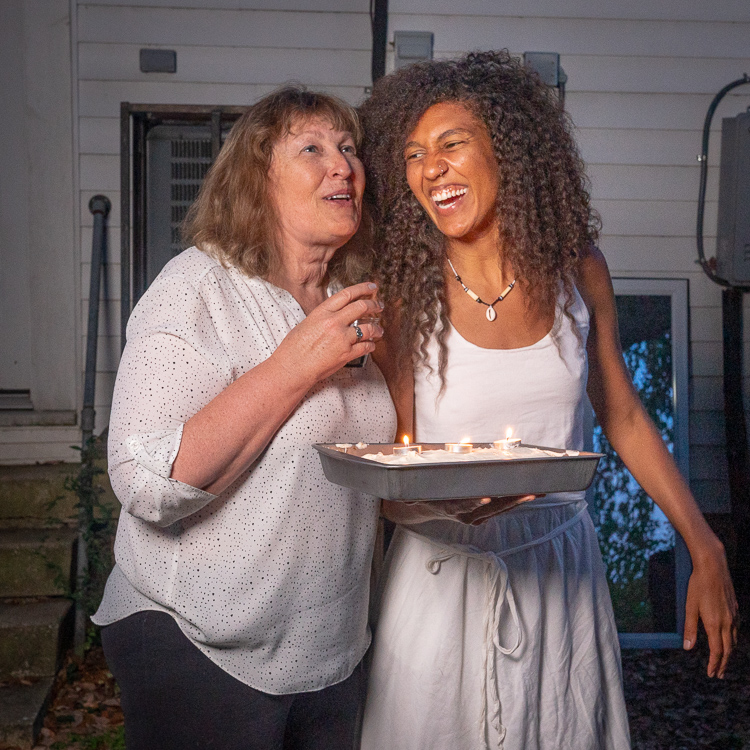
Q: Sorry, your friend was Cameroonian? Diane: Oh, he was Nigerian. And I basically knew after that trip, I was just like, Okay. And I told him while we were there, I said, like, Look, I don't know if I'm feeling this anymore. I basically told him like, Look, I love you and I think you're an awesome person, but I'm feeling like this disconnect from you energetically and spiritually and it has to do with a lot of the processes I'm going through, and that I know that I'm going to continue to go through. And I think I just had to really figure out what was going on. That compounded with the fact that I was basically really stressed out financially because I just lost a job. And I didn't feel that he was a person who could have financially helped me and that time, made an effort to do that. And I'm a person who, if any of my friends ever don't have money, that money is there. I might not get that money back, but if I care about you, I'm gonna take care of you. And that to me, you know, I don't see it as like the sexist thing. I don't see it as like this man that you need to take care of me. I see it as the fact of like, you saw somebody that you supposedly loved, who was in a crisis, and it would have been very easy for you to help but you didn't. So all of that compounded made me realize I don't think this is gonna happen. I don't think it's gonna happen. So, I left. And basically I was trying to figure out what the hell to do. I knew that I had a few pockets of money in certain places, as my life works. One of those was in Rio where I knew I should work. And then in Buenos Aires as I knew that I had documentary money still. We had a fund, you know, we were given a grant to do this thing. So I would go work and I would pay myself every time I went. |
![]()
So this time after that, I had already decided I was like, well if my life path is going to Tantra though I'm committed to this. I don't know. I don't know where the money's coming from, but I'm going to go figure it out. So basically, Salvador and I had decided that hey… He had basically told me like, you want to work? Like this is what I do. I work. He basically would make his money every day in Rio playing on the metro subways. And you make decent money, I must say. |

Q: He's so committed to music isn't he? Diane: Yes. His absolute love, and I respect that. And so, we basically were like, okay, there's this course in Sao Paulo that I really wanted to take, which was the last course that I hadn't taken, which was like the multi orgasmic training course, Tantra. And I said, if I do this course, and I love this course, I'm going to go live in the Tantra commune, because then I can just dedicate myself to studying this. That's also in Brazil. And so I told him about it. And he was like, "cool, I've got a gig. So let's go. I'll play in Sao Paulo, we could work together. And then we can take this course." Q: He's basically this existential guy who's practical. Diane: Super practical. I mean, I didn't make my money into like, I do my things and I'm happy. I want to make some food and have a house. |

Q: He sounds very spiritual. Diane: He's very spiritual. He's a very special human. that's how things are like, that step will lead me to this step. And that step will lead me to this step. And yeah, as long as there's nature, he's happy. So that's the hard part about the city. So we did the course in Sao Paulo, and the course was pretty amazing. And I decided, Okay, I'm going to do this course. And then I'm going to have to go to that the Tantra commune eventually. And they had the thing where you could work to pay for the course for yourself. So if you lived in a company, and you worked on the commune you could pay to get trained. So once we did that, I met one of my favorite Tantra teachers there as well, who's also a musician. He's a theater person. And he was basically just like, hey, you're always welcome here. You know, you guys want to come back? Come back. And then in Sao Paulo, for the first time I learned how to work on the metro. So he taught me basically, this is what you do. And I remember the first times I was just like, this is scary I'm nervous, you know, like, I can be on the stage. But when you're literally in a metro, you're doing something illegal. You're doing something that you can get kicked out for, doing something where you have to put yourself, there's no barrier. You're literally like, Hi, I'm here, I'm showing you this. If you like this, you give me money. If you don't like this, then I move along. And it was mortifying at first and then it became incredibly fun and exhilarating. And we would work in the morning, you work for a few hours, you make your hundred bucks or whatever. And then we would like change our coins for restaurants because they want change, and they would give us free food. We'd eat for free. And then if you really wanted to make money then you'd work at night too. You work the night shift and then you know you'd make another hundred bucks or whatever and that's life. It's simple. And since I didn't have another job, I did that. I made our money. We made the money for the course and we made the money to live. And there I did the final preparations. I lived in my friend's house who's one of my best friends, we always live together in different places. And I didn't know what to do though. I didn't know if I should go back to the US and like start a lawsuit to get this thousands of dollars that were owed to me. I didn't know whether I should try to just go back and get a job to make more money. Maybe. I didn't know what I should do. and Salvador goes, "Well I don't know but I'm going to Buenos Aires. I'm gonna go visit my mom." And I was like, Oh, I have money in Buenos Aires. And when I started this, because I had my documentary money. And I was like, I could do that. I could do that, go start by paying myself so that I could pay for the ticket back to the US so that I could make money in the US. And so I did that. I went, I took my GRE in Buenos Aires, worked on my documentary. We did a few shows down there. I did a show by myself with other musicians. And I paid myself, paid for my flight back to the US and turned in all my materials. By that time, basically, I knew that my base relationship wasn't going to work. So I kind of had to have that conversation eventually. I went back and kind of established a contract with these consulting people again, just to be like, okay, let's write a contract. What am I going to do? I'm going to do this. Okay. So I worked, made money, went back to Rio. I was planning on being in Rio for a little bit. And initially the idea was, is like, I'll be here for a little while, and then I'm leaving again. Q: But you were able to balance your spirituality with doing a job job job. Diane: Oh, I mean, consulting, for me... I was consulting for a grassroots nonprofit, a multimillion dollar grassroots nonprofit, who is a former Black Panther. He's also Islam. He's a very spiritual man. Okay. So for me, it was building my community. I'm building a community. Q: Were you organizing? Diane: So I've never been an organizer. I mean, I had to help run events and stuff in the community. But I was always more of the writer, the photographer. I produce material. Q: So you can do that? That's something some people can't necessarily do, they have to sit on top of a mountain… so, cool. Diane: Absolutely. Well, and for me, that is very much a part of it. Like that's a very spiritual process for me being able to build communities. I think when people feel that they belong, or where people feel that they are safe, then they can begin to connect again to themselves. And if you never feel safe, if you never feel that you have money, or if you never feel that you can live without violence or without people threatening you are without being arrested. Q: I have to say yesterday evening [at the yoga class she taught], you produced an extraordinary feeling of safety in that room. Diane: Yay. Wonderful, it was a great group too, I must say. They were. It was a lovely, they were very open. |
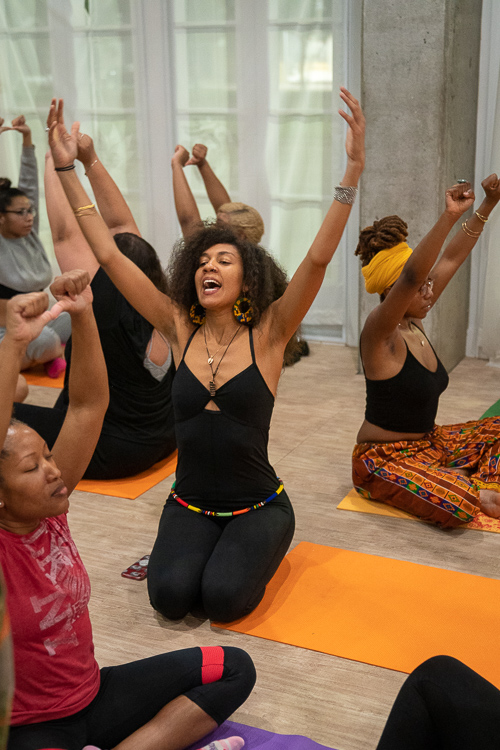
Q: But you were doing real work. Diane: So basically, I was supposed to be in Rio for a few weeks, we kind of agreed to that. And then again, I was there for a few weeks. I'm producing all the materials I said I was going to produce. I was doing his press kit. I was reading his bios, I was, you know, editing all of his photos. I was finishing up their edits for the website. You know, I was making press releases, doing all the stuff that I promised I was doing. I wasn't getting any feedback. I was like, well, what's going on? Literally two weeks into it. I got a message from his secretary saying, "Diane, we don't have time to process all the work that you're doing." I said "I literally just wrote a contract for you telling you exactly what I would do every week. And now you're telling me…" "Yeah, we just can't right now. I'm sorry." So I was heartbroken. First of all, because this is an organization that I've worked for for 10 years. And second of all, I was like, you guys are fucking with my life. Like, I literally just came back to United States to re-establish a contract with you. As soon as I come back to a place where I'm supposed to be, you cancel this contract. I was like, what's going on? That was the last time I worked with them. It was it was weird. It was heartbreaking. It was really difficult process for me to admit. But there were these breaks as my mae santos would say, like this is going to keep happening to you. And it did, it just kept happening. And I was like, What the hell. And so again, I was really emotional. I was like, trying to figure out what the hell was gonna happen. And so I was like, Well, you know, if you want to work, work. |

I ended up just staying in Salvador's house in Rio. And from then, from that point, you know, the idea was like, well… he was like, What? You have a boyfriend? And I'm like, Well, I don't really have a boyfriend anymore. My base relationship is not working out, like what are we trying to do? So, we just decided that we would be partners. I say it very easily. We decided that we would be partners, we would work together and then we'll see what happens. So we live together for a while, and then he was going to take his trip to Europe. And I take my trip to the commune. So he went to Europe about a month before I left. I kept working in Rio. And then I kept working with other people. And I knew the ropes. And then I moved to the commune. Before I moved to the commune, I met another Black woman from D.C. who also lived in Brazil longer than I had, and worked with Tantra from the same place I was trained. And she called me and I met her. She said, "Oh, you do audio visual. Well, do you want to do some things for me? Do you want to produce things for me?" I was like, "Yeah, I produce." So I went to produce a video for her. She said, "Why don't you come to my workshop?" I went to one of her workshops, which I'll probably do at Magnolia [Yoga Studio] now in March, which is more like women's health. And in the middle of the workshop, she looks at me and she goes, "Oh, we're gonna do a yoga part. Maybe you should just teach this part." Did not give me any warning. And me being the person I am, I'm like, "yeah, sure, great." I got up, I teach the yoga part, I teach a lot of what, you know, we did the other day, just how to do certain things that are really good for feminine health. And afterwards, she said, "I really like how you teach that. Maybe we should work together. I want to go to the US. Why don't we do things in the US and see if that works? Because neither of us had ever done this work in the US." And I was like, okay, so I'll be like your assistant, I'll be your producer. Well, eventually, that became, no, we're just working together. So I went to the commune. While I was in the commune, we planned everything from afar, produced all of their events. We planned workshops in Pittsburgh, New York, DC, and then another one again in DC. And so after living in the commune for a while, I flew back to the US. We did these workshops together and I spent maybe three months in the US doing workshops. And that's when I found out that I got into Tulane. And the workshops all went really well. We worked together really well. We balanced each other out, she and I, very well, with our different skill sets, and our different attitudes and like different preferences. And she was like "Well, great. Sounds like we should probably be working together." |
![]()
Now, when I found out I got into Tulane, I was still in Brazil, but it was right before the workshops. And I thought I wasn't ready yet. So I deferred a year. Yeah, they're pretty chill. They were like, "Yeah, okay." My dad had cancer recently. So, I knew he was okay. That was not the reason that I that actually I deferred, but I told them I was like, look, my dad recently found out he has cancer. I want to make sure that I'm going to be able to take care of him. I need. So they were like, "Cool. come next year." So I did. I hung out with my dad for a while, made sure he was cool. And then went back to Brazil. Went back to Rio. I did another massage training in Ayurvedic massage. |
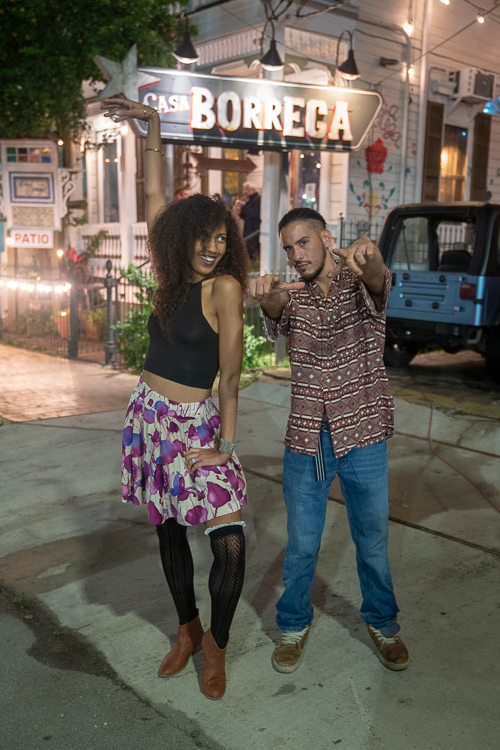
And this is the point where Salvo was thinking I need to move from Rio. So the neighborhood, the favela, that we lived in was getting pretty heavy because there was this drug war that was going on. So everybody was just carrying guns and, and there were shootings all the time and people were dying all the time. And he was just like, "I can't really do this anymore." And so we decided "All right, let's do like a tour. Let's go nomadically." He used to do that a lot. I've never done that. So we went, we lived on an island. We played, we lived in Sao Paulo, Rio, and another island. And while we were doing that with my other friend, we were planning a women's retreat in Brazil. So I did that, we did our women's retreat in Brazil, and from there I went back to the US for a little while, worked, did some couples work, did some things. And I decided I wanted to do this training, psychological bodywork training in the UK, because it was the only way that I could be legal doing this work here. It's a training course. |
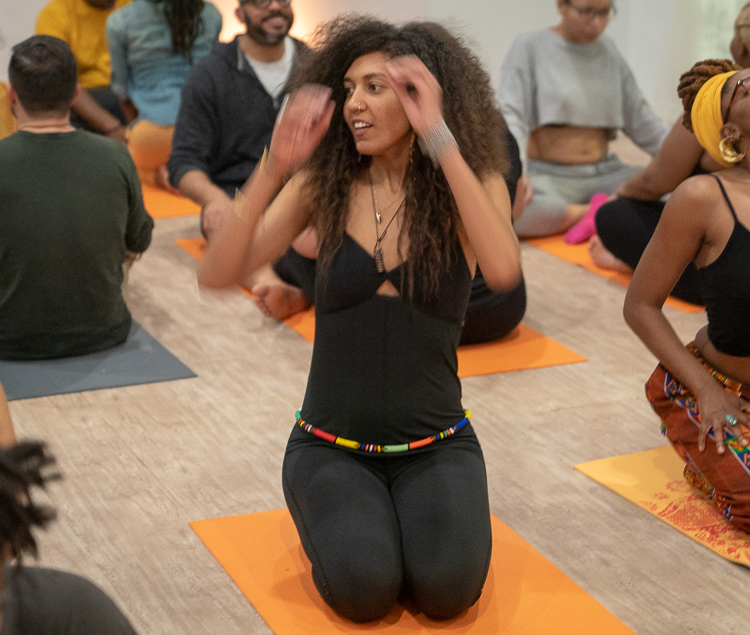
Yeah. So we did our women's workshop, it was amazing. It was like the longest experience that I had with working with a group of people. And then yeah, I came back to the US to do some more work, some couples work, some more massage work. So I wanted to go do this training because I felt that the Tantra training was very strong in some aspects, but I wanted to understand Neuro-linguistically, I wanted to understand biologically, scientifically, and psychologically as well, the things that were happening, to be safe. You know, I wanted to have a more Tantra informed, because Tantra sometimes, you got these trainings that people just like, "Yep. All right, everybody get naked," and like, and that is not safe for some people. You have to go through processes to get there. And so I wanted to make sure that I was being safe with the people that I was working with, if I was really gonna do this work. So the course was like $5,000. And I was like, "How the fuck am I gonna get that money? I don't know. I'll figure it out." I basically put it all on a credit card that had. I had a year and a half to pay it off with no interest. Sally and I and my Tantra partner had decided we wanted to do a Europe trip as well. So I said, "Okay, cool. Well, I'll do that course. And then we'll do Europe, we'll do our Tantra and we'll do music. And then I'll come back and start school." So in Europe, Salvador started doing that part of it. He came and did a course with me in Sao Paulo Q: He doesn't have that background right? Diane: No, but his mom was actually part of this background, she would study Osho and all this stuff. So for him, you know, I wasn't so weird. You know. We actually started working together when he met my Tantra partner. We were like, "Oh, we should do some music stuff." So while we were in Rio, we started doing meditations together where he would play. And basically, we did Europe. So I started the course, and the course was amazing. It was like a six-month-long process in terms of doing, learning, there was part where I did like three, four months beforehand, learning everything online. And then we spent time together in Europe and then after Europe, they basically supervised me for various months afterwards, as I worked with clients. And the training was amazing. And then I met Salva in Germany. We did Germany, and we did everywhere. Yeah, we did Berlin, we did Paris, we did Barcelona. And we worked London, we worked at festivals all night together where he would play, and we do massage, and I'd do massage. Or we would do tantric massage two hands for people or couples. So yeah, we've begun to integrate those worlds as well, because they're naturally very integrated. And so, by the end of that Europe trip, I was exhausted honestly, like moving around. I was just like, "Okay, I've done this." I would tell him, I'd get really emotional and just be like "I need to find roots. I need to find roots like my body's telling me I need roots. I'm not happy because I'm constantly moving and I have to figure things out and it's like stressing me out. Plus, I've got this course that I'm doing, plus I've got...it's just like too many things. I need roots. My body's telling me I need to root myself." And he was like, "Okay. You're going to New Orleans, that's what you're going to do. You're gonna get roots." But I was worried in the back of my mind that like when I got roots that I'd be like, "No, okay, now I need to leave again." Cause that's what happens, right? So, I flew back first because I needed to start school last week of August and he stayed to keep working for a while. |

And then that first month I was here like setting everything up. So I found the apartment. My mom drove down with me from Pittsburgh. This poor baby drove down 20 hours. This was the first place I looked at on the list. I looked for hours and hours and days and days, of course on Craigslist and everything, but this is the place I actually went to go see. My mom didn't like it. I was like "Mom, this is gonna be the place I'm going to live." So I started the program here. Immediately. I was just like, I like this neighborhood. I like the fact that, you know… in Pittsburgh, it's really difficult. Because mostly every Black neighborhood is, you know, riddled with.... doesn't have a supermarket and is riddled with violence because it's riddled with poverty. And so my dream has always been to live in a working class Black neighborhood. Like, for a really brief stint in Pittsburgh, but mostly, we lived in like a mixed era. Like, my mom now lives in a pretty mixed neighborhood. But I never lived in a working class Black neighborhood where people talk to each other and people are cool, and I found this and I started going around talking to neighbors. I met Shantay, she invited me in, and then I just walked around and talked to people. And it was like, this is the neighborhood I want to live in. Broadmoor. This is it. Consequently, I didn't realize and didn't remember that my old lover lives like six, seven blocks away. Which is fine. It's totally cool, but it's like I didn't realize that this was also his neighborhood. And this is also the neighborhood that I've always loved. Cause it's close to Tulane. It's close to everything. It's chill. It's affordable. And this place is rent-controlled as well. Right? So I'm paying for great place, I have a room to be able to do massages, and I have plenty of room to do yoga, dance. There's a backyard which was really necessary for me. I'm a big porch-sitter and a backyard-sitter. So basically, it was like, "Okay, this is this is gonna be my home." There was another one that was all the way down to Esplanade. And I was thinking about it like "those days where it's rainy, and I'm gonna have to get to school, and this place is… No." I was like, "This place. It's open. It's what I want. This neighborhood is what I want." And so, yeah, I just did it. My mom was here for like three days, found this apartment, she helped me move everything in. And I put everything together. Then, well, he started putting all the furniture together because I couldn't do that. Then he came as well and I started school. And I think that's a good place to stop and eat some food! |
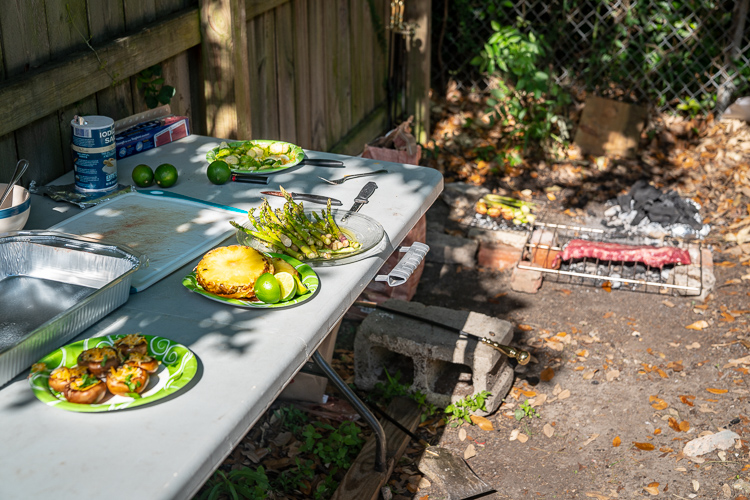
![]()
[Continuing the interview a month later] Q: So I think you came to the point of arriving in New Orleans. Do you want to continue with how you navigated the new place, and found your social niches. And, and within that, especially the neighborhood. I think also, you've been building several communities. Diane: Even as I've been reading more theory, even with the word community, I've changed the way that I think about the word community as well, because of the normalizing and stabilizing tendencies that the word has, which I never thought about. I was always just like "community." And now that I've been reading a lot of more like queer theorists, it's like the word community implies that, you know, there's kind of this stable set of restrictions and stable set of ideas and a constant participation that has to happen. They're like, we think of things less of like community, and more like networks. So the thing is, those identities in those communities overlap. You know, and that's where things get funny because we're constantly theorizing about these communities of separate identities. Like you're in the Jewish community, or you're in the Latino community, or you're in the Black community or the gay community, or you're Black and you're Latino. And there's so much overlap there. |
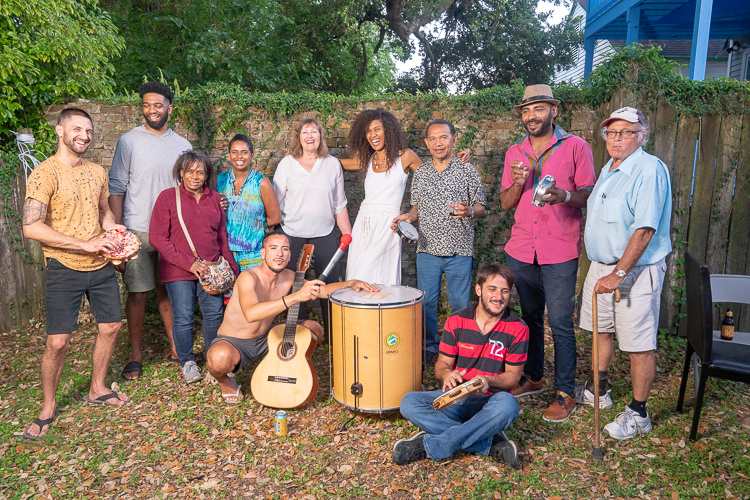
Okay. So navigating community making. I guess the first part of thinking about this, upon arrival, is thinking about how I chose to live in this neighborhood. And I think it was a very conscious decision. I had been looking at houses and apartments for a while online. But I was in Europe. And I was looking frantically. Well, I can't even say frantically, I was just looking kind of the way that I've been doing everything. Just like doing 80 other things and calling people on the weekends and being like, "Well, but I don't have a number that you can call me back on. Like, do you use Skype?" And so I ended up like posting this post online. Just being like, "New Orleans and looking for an apartment, can you please help me?" Like somebody give me an apartment. So as I started on this long-distance search, a lot of people will respond and I talked to certain people and certain people would say, "Are you sure, as a woman, would want to move into this neighborhood?" A lot of times if it was like Ninth Ward, or if it was parts of Storyville or whatever, that the realtors would respond and say, "I don't know if this is a neighborhood for you." Which is really interesting. An interesting assumption to make. But it's kind of like this thing while "Oh, I appreciate your concern," but also like, "That's really messed up how we're marking different neighborhoods as undesirable, unsafe, and dangerous entities, like as fixed entities." I just was like "I'm just gonna go, I'm going to go to New Orleans, I'm going to look at a place. And I'm going to find one. Because this isn't working." So my mom and I drove down very shortly after I arrived back into Pittsburgh. I literally got here the day before orientation started, cause I just like to give myself lots of time to do things. And my mom was going to be in town for three days. And she's like, "We're going to find an apartment." I was like, "Maybe." So we went to go see a few places. The place that I'm living here in Broadmoor was actually one of the first places I saw, the first place I saw. And I when I came here, when I saw it, first of all, I loved that it had lots of space and sunlight, backyard, front yard. And when I came back to this neighborhood and realize like, "Oh, I've been here," and "Oh yeah, this is like a working class neighborhood. This has been my dream my whole life." But that sounds so weird, right? But this is the type of neighborhood I've always fantasized about living in because it was never possible in Pittsburgh. Pittsburgh, in terms of how it is formed, is just so segregated. And then you just really don't have any Black middle class. And hardly any Black working class neighborhoods. You have mostly neighborhoods that have been so affected by blight, and so affected by the 70s and 80s, of the collapse of the steel industry, then there were no other ordinances put in place to actually train these people to do other things. So as soon as that industry was collapsed, Pittsburgh used to be a thriving Black community. The Hill, jazz, you know, there were so many cultural institutions that were famous with Black artists, but after that, crack and the closing of these industry just left Pittsburgh a completely different place. And so recently, it kind of recovered from the steel image of being this gray and smoky place. And recently, it was called "the most livable city," which, for some people is true. It is still probably one of the most segregated places and also one of the worst cities in the United States to be a Black person. So I had always dreamed of being like "Wow, I can live in this Black neighborhood with neighbors that I know and we talk to each other." Like I would go to certain neighborhoods with my dad and my dad would come pick me up and then call the police, because if I go to like visit some of my friends, there would be people cleaning their guns all the time and with their guns on the porch, right? So there was just such a stark contrast. We're like "well where the hell do we belong?" We couldn't afford a lot of the other better neighborhoods, supposedly. So it was kind of this dream to come back here and then realize that this house is owned by the Broadmoor Improvement Association? So that's why my rent is cheap. Yeah, so I guess that was the magical part of this neighborhood was just feeling like I was fulfilling this desire that I always had. And I guess it's funny because a lot of times people might dream about bigger and better things like "I've always dreamed of living in a mansion or something like this." And for me, this is definitely a dream, to live amongst people who just work hard and like to sit on their porch and like to talk to their neighbors and actually interact. Even lately, after we started this project and after I started talking to Alexis Deval who was the other part of the "gayborhood" around here, she was telling me about how her neighbors had perceived her, and how happy they were that she was coming in. And she said, "Wow, it's so interesting, as queer people of color, when people are excited that we're getting here." She's like, "It means that there's been other invaders who were like, way more undesirable than we are." So I started thinking about how people are perceiving me, even if I'm not perceiving me how they're perceiving me in this neighborhood. Because yes, I can blend in in terms of this is a Black neighborhood, but I'm still a Northerner, I've been living out of the country for a long time. We're kind of a little strange unit of people who are coming in and out. |
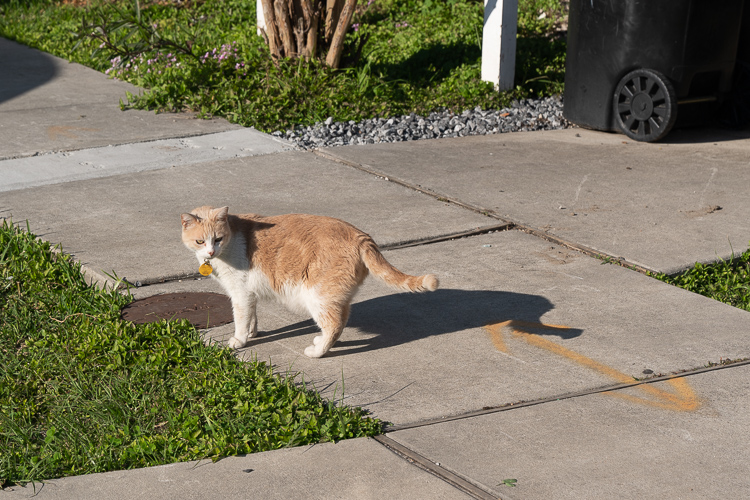
I came back and I talked to neighbors, and talked to the people walking their dogs around, and knocked on her door, my next door neighbor, Shantay, and I was like, "What do you think? What do you do?" And you know, she's a school teacher and she was like, "Oh the neighbors are all really cool. This whole house is full of cool people, we all love each other. The other people that are a little crazy, the little crackheads in the front, but they don't touch your stuff." I was like "cool. Don't touch my stuff. We're good." I kind of knew that this was the right decision. And that this was the place to be, that this was going to be my home for a while, and my place of work, and my place of study and my place to share, and commune. So it was really exciting to have a home again. And so I think at first, I kind of wanted to establish myself here in the neighborhood, first with just the neighbors. And so we became really good friends right away. She's my roommate, right? Because in a little shotgun you can hear everything. So I kind of look at her as a roommate. And, you know, she was really integral in my feeling like, I was accompanied here. My first semester was a really difficult transition, to come back of just like so many feelings of like, "What am I doing? Why am I back here in this institution? Why do I have to do things that people make me do, where I'm not used to doing that anymore?" And then lots of feelings of inadequacy of like, "Am I ready for this again? Do I still have these skills?" So everything was very challenging. Plus, I had to give up a lot of things that I was doing before to refocus on school, because the time just wasn't enough for me to actually function well. So, you know, I had workshops planned. I couldn't do the workshops, because I was realizing I was just not able to work as fast as I used to when I read and when I write. It's hard now. So there were days where I would be really sad because I was just taking so long, I wouldn't be able to go out, and I wouldn't do that. And I remember one time, I was really sad one day, and I like woke up and I was just having all of these doubts about whether I should have come back to school and whether this was the right idea. And I remember Shantay had knocked on the door, my door's always open. And so she'd come in and I was like sitting on the couch crying because I was just sad and lost about why I wanted to study again. And she was so surprised that I was sad. She was just like "Let's have a barbecue." And so she grabbed me, we got into the car, she's like "We're gonna go to Rouses, let's go, let's get stuff for BBQ." We got everything. Once we got there, she was like, "You know what? No." I was like, "Okay, here's my part." She was like, "I'm not taking your money." Now, it's like, "What do you mean?" She's like, "This is just so you know, there are people that care about you while you're here. And that when you need it, we're here for you." And I remember I started crying again. Now I was feeling so touched that this person who had just met me would go out of her way to make me feel like, "No, you're my neighbor now, you're my friend now." I'm getting all emotional again. Because she just really made it so clear that she was happy that I was here and she was happy to be sharing with me. "Where are we gonna go out this weekend?" "Where are we going to go dancing?" The fact that she took me up on my offer and would just come over whenever, open the door and come hang out, come and talk, come have some food. It was really such a huge difference to thinking about what it was like when I had lived in these more affluent neighborhoods all around the world where, yeah, I was in this penthouses or whatever, but then I would go to a neighbor or whatever and nobody would ever invite me into their house or even open the door for me if I needed a knife or something. It was always like "This is my private space," where I feel like, in this neighborhood, and I think a lot of times in a lot of working class neighborhoods, there's this idea that "No, you're welcome inside my home. And once you're welcome inside my home, you're always welcome inside my home." And that was a huge thing for me here. Literally everybody on the street is such a light in terms of everybody possible says hi to you, anybody who's sitting on a porch will at least acknowledge your presence, they'll yell out to you, my neighbors driving by in the car. You know, if I'm not paying attention, sitting on the porch. It's a type of thing that I never really experienced as a child. Because even the kids that I would hang out with from my neighborhood would get in trouble a lot so my mom was always "the neighborhood kids" or this and that. I think my mom wanted us socially to be very responsible. We'd always hang out and if we'd get in trouble then we'd get in trouble, you know, normal kid stuff. But to be able to feel like "Oh yeah, the neighbors are accompanying me, and I can accompany them, and they're happy that I'm here." It was something I never felt before. And so it's really, really awesome. |

I'd say the only trouble spot that we ever had in this neighborhood, and it's not even really trouble but it's just kind of anecdotal, right? Like, because my neighbors are always just like, "Well, you know, I just get my snapchat material every week from the crackheads in the front." Whenever they get a little crazy, she just films them. And so for a while when they first got here, they were fighting a lot. So there's a couple that lives there. I mean, they must be on, I don't know if they're just on crack. I felt like they were selling for a while because there's always cars pulling up, people honking in the driveway. The guy says he's a mechanic. Although he was very upset that I was asking him what he does. But when I did, I was like, "Okay, buddy, calm down. I'm just saying that because I have an old car. And I might need help sometimes." And he's like, "Oh, well, right now I'm fixing my own guys, because he's got a line of broken cars in front of the house." And I think the only thing that every once in a while, we would all talk about and complain about together, the fact that they would just get really high and yell at each other very violently, at whatever hour, during the day, in the middle of the day, sometimes you'd see them yelling really violent language. Like "bitch" this and "bitch" that and both of them with their kids around. And so eventually when I got to the place where I saw, you know, people picking up objects and throwing things and it would get into odd hours. Then I eventually I told my neighbor. Eventually I was just like, "Look, we just need to start calling the cops. Because you know, at least they still know that somebody is watching and somebody is not having this." You know, people get high and they don't even think about their surroundings anymore. So you're not thinking about the fact that it's four in the morning and you're yelling, and everyone can hear you. So eventually, when one evening I heard them yelling, but we're all the way in the back. So can hardly hear anything, but I went to sleep and I could hear them yelling and I was like "Oh okay." Apparently one night she calls the cops. And apparently the cops came and she says "I don't want you to knock on my door. You're going to pull up and you're going to see them fighting. Don't come talk to me about it. Go talk to them." So the cop cars arrived, and the first thing they do is not only try to knock on the door, they knock on my door. I was asleep. I mean, I don't usually like using the term like these marker terms like the "crackheads" and this and that. But I did. I remember at the beginning, I was like, "Okay, well, that's fine. They use drugs all the time. But they're my neighbors so let me try to engage and create community with them." And I tried at the beginning, you know, and I would try to greet… There was never even much of a response sometimes, like, sometimes I would just be completely ignored. And then even at some point I was just like, "Oh, hey." And he looks at me. And I go, "How you doing?" He said, "Oh, I've been better. I tried to go sell my car, and they didn't want to take it. So do you have 20 bucks?" And I was like, "Are you asking me for money right now?" I was like, "Hell no." It's like we've crossed lines here. We are not doing that. So after that, I was kind of just like, okay, you don't really want to be my friend either. So it's fine, we can be cordial. you just live your life. As long as you're not yelling or breaking my things, we're good. I'm very aware of the ways that I, as a person, am very indebted to the energy of those around me. And so I'm always creating networks, creating communities, finding the ones that I can contribute to, or that can serve me and finding the places where I'm most fulfilled. And it's something interesting in terms of our relationships that we have to navigate, because it's something very important to me, as a person who also is kind of the black sheep in my family. In terms of nobody really built with me on a basis of mutual interest in my family, like nobody else plays music, nobody else. We do a little yoga with my mom. But other than that, like siblings, I have two older brothers. You know, one is in the military, the other one is like a poker player. So we're all just very different. And I'm kind of the weird one who went out and did crazy things. And so, to me, my chosen family has always been very important. To be able to just express myself as who I am and not be constantly questioned about it, which I routinely am within my family structure. |
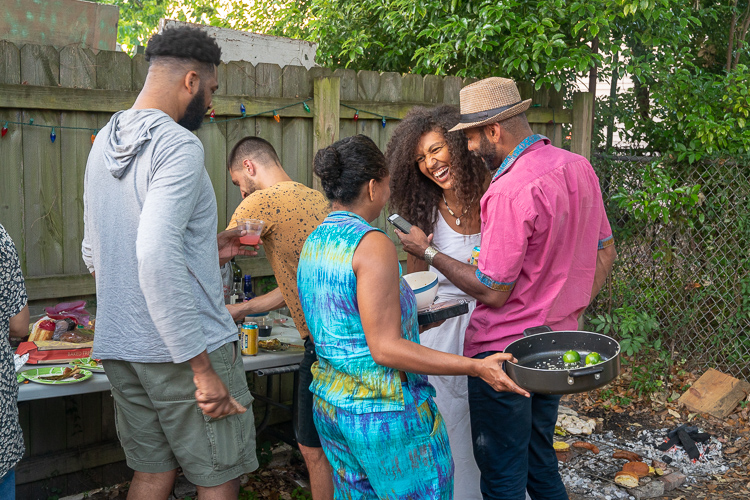
So, for Salva, for example, he was raised by single mother, and spent a lot of time alone, spent a lot of time just with his mom, or spent a lot of time with his friends. And so for him, that idea of like community creating and all of this is something very new that he kind of observes from me. I think there's an interesting navigation, because he sees how much time of my time that it takes, which is this thing of like, "Well, you do this. So when do we have time for just us alone?" But there's also this idea of like when we have a barbecue, and you just send out a text message, and there's 35 people here, right? So we talk about kind of that relationship, and that need that I have. Then we have to navigate it because for him, he'd be happy if our relationship continued the way it used to when it was us. We would work and be together all the time. And for me, especially here, I'm like, "You have to understand I'm establishing myself right now in a different place. So that takes a huge amount of time and effort to observe first, where are the places and who are the people where I can actually contribute to, and where long term I will feel held, and I will feel like I can hold others?" And then where are the places that in terms of my interest and my business interests, that I can feel productive and actually make my livelihood as well? So those things are all connected. It's my family, but it's also the people that come to my workshops and the people that will then spread that information and the people that are supporting the things that I do. And we can we support each other. And so it's a very kind of new concept that he has observed in terms of what I do here, because we'll go somewhere, and it's like, "Oh lord, if we go to that event I'm gonna have to stand there and wait and see you go talk to all the people and greet everybody and give everybody your business card and then two hours later we're going to actually be able to leave." And yeah, I'm very guilty of that. I'm very guilty of connecting all the time, and trying to make networks all the time and, but it's something that gives me a long life. |
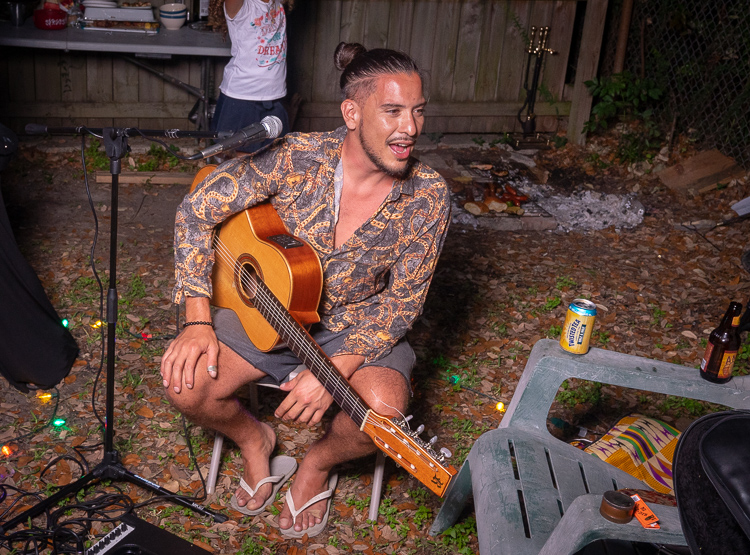
![]()
Okay, the communities here. So I guess the first and foremost, the community that I had to find was school [The Latin American Studies graduate program at Tulane]. I guess I realized very quickly that I don't have time. I don't have time for a lot of things. And I mean that in the Maxine Waters type of way of like, "I just don't have time for your bullshit, I don't have time for you observing me, I don't have time for you not understanding or not seeing me. I just don't have time for it anymore." So I found very quickly which people, which professors are people who understand that academia, for me and for perhaps them is not, is not this theoretical thing. It's something that we live, hopefully, it's something that we understand, we want to know how it affects ourselves and how it affects the community. And, you know, the people who are either completely obsessed with that, or obsessed with the competition of being able to ascend as an academic, obsessed with getting all the reading done, obsessed with making sure that we're doing well. And then not being able to handle shit, anything else in life or handle social commitments or handle emotional commitments? I don't have time for it. There's a lot in my cohort who I'm very cordial with. But I realized very quickly these are the people I didn't come back to academia for. And it's fine. So I found one of my best friends, who is 23, and we do all of the same things. You know, we spend yoga together, we dance together, we study together… She's everywhere. So she's so beautiful. And you know, I'm kind of a prickly person at this point in my life, you know, I've identified very highly as a hedgehog, where like, I can be very prickly, as like a protection of my personal space. And I've learned to be very prickly. And she is just so warm and so soft, and so loving and forgiving that she really helps to keep me remembering that like, it's cool, like I have that love and support here. But what I have realized as well, in terms of making committees at 2am, is that I no longer have very much interest in the traditional political communities at schools. So the things like organizing conferences, being the president of this, I've done it. I did it a lot. I did a lot of organizing of conferences for the last 10 years, of events, of activist groups, politicians, and you know, getting funding and writing grants and getting money and bringing people and organizing people and moving them around. And because a lot of American cities are very small, there's a lot of expectation that you do those things. You know, it's unspoken, somewhat, but then they're like "there's not many of us, we need your support." And literally, after a while, I just kind of threw a tantrum just so that people understand what I'm saying. I'm like, look, y'all are like 25 and this is your first experience. Good. Organizing conferences. You wanna organize conferences? Then organize conferences. I was like, I don't care about conferences. You're not paying me enough to do this. I'm here in the studio. I already know what I'm here for. I've done this already. I don't want to spend my valuable time sitting in meetings that I don't care about. Q: Were the requests coming from faculty or from students? Diane: Both. So I did this in front of the director of my department, and who are the students like the cohort, who is who was organizing it this year. And I said, Look, how much money are you guys getting for this conference? It's something, nothing like $3,000, or something. I was like, Look, that's fine. You want to give me that money, give me money, I'll organize you something. I was like, it's not going to be an academic conference, I can promise you that. Because I'm sick of us sitting and talking to each other about nothing, about the theories that we have on the people that are outside of the walls. So why don't we do something different? And so this year, my advisor of our department, who is an angel, he is just the sweetest man. And he should get all the credit in the world because he is such an ally, not only to people of color, he is just such an ally, and an advocate for us as students in the most progressive ways. And we have a very conservative president. And he is always there advocating for us in the ways like that we need it. And so when I started complaining, he looks at me, he goes, "Diane, I'm not going to force you to do anything. So you want to take that money and do a different kind of community conference? That's your right." I was like, good. So now the person who's running for president of the graduate Association wrote us an email being like, "Well, there's been some mentions of creating a different type of conference this year. I'm very happy to do that." I was like, cool, let's do it. But I have realized that within academia, the status quo is go along with what they tell you you need to do. And this is how you ascend: be the president of the Graduate Students Association, find your faculty advisor, be politically active, go to events so that they know you, do X, Y, and Z. Literally, we read books about it, about how to ascend in academia. And I realized, I don't play by these rules anymore. I don't play by these rules in my life. So why would this be the way that I'm going to ascend in something, it will make me miserable. So I've realized how jarring it is for some people, my presence, and my constant questioning of things. And I've come to really love that. Because I don't do these things for reaction, I do them because I have tantrums inside of me where I'm just like, I don't want to be here at the conference, I didn't go to the conference, I didn't go to one event in the conference, I don't care. We're not doing anything for people who could actually use that $3,000. And so I have realized how important it is to be a jarring figure sometimes to create different modalities. And I've gotten to be able to do it without shame. And even recently, like, last week, we had an event. Oh, this is pretty cool. Actually, there was a Brazilian, like one of the head Brazilian scholars. And he is really amazing. He's at Brown. I went to his presentation, it blew me away. He was on his sixth book. He's just very prolific. And I'd go to events that related to what I'm studying. He's a queer theorist, and he's a revolutionary. He's friends with [former Brazilian President] Dilma [Rousseff], he's friends with all of the revolutionaries in Brazil. He's dope. And I was like, Oh, this guy is really doing stuff. And I met him. So at that day, at his talk, I was just asking him different things about what he thought about intersectionality within activism, because this is the year anniversary of the Marielle [Franco] assassination, who is a Black queer activist in Brazil. She was assassinated, very bluntly, assassinated, you know, she was working for the people. They came and killed her in her car point blank. And Brazil is serious, if you're questioning status quo, there's so much like, targeted killings of those who are doing work, whether you're an indigenous activist, whether you're a land activist, people die. And then it just continues. So they're going to organize another conference, another event honoring her for the first anniversary. And as I usually am at Tulane, I was the only person of color generally at all these events. But at all these meetings, the Latin American girl is very White, but she's not usually at events. I usually go to one if I wanna go to one. And so, when this White Brazilian professor's organizing this event, I was like, you're organizing this event? I was like, please put me on that list. So when we actually got to this meeting, of course, again, I was the only person of color, only Black woman. They're organizing an event for a Black feminist activist. And I'm sitting there. And I take the head of the table very purposefully. And I'm just sitting there quietly watching these people talk about her, talking about what we should do and what the event should look like. And I look around and I'm like, what is this bore? Like, what is this about for you guys? They're like, "well, you know, we wanted to have a musical tribute and maybe a political act." Okay, a political act, I said, What is going to be political about it? I'm like, because for me, here's what has to be political about it. I'm the only Black woman at this table. That's mother fucking political. We need to have Black women who are planning this conference. And I'm American, keynote. The first thing I'm going to do, I'm about to call up my friends in Brazil, and ask them what they want. And they're like, "No, no, no, that's good. That's good." I was like, I just feel like if we're going to do this, and we can't privilege the voices that we're actually supposed to be honoring, why the fuck are we doing it? For us? To show people that we care? Who's there? Who's there to show the people that are dying every day? You know, the Black queer women who are going to be killed every day because of [Brazilian President Jair] Bolsonaro. Bolsonaro said he would kill his son, he would disown his son, if he was homosexual. Oh, he's got a lot of terrible issues, he wants to get the indigenous people off their land. He's a demon. And he's a neoliberal demon, like he is what we know that we're facing right now. And he is worse than Trump. Because Brazil has way less checks and balances in terms of what he can do and what he can't. And Brazil, in the last hundred years, has had almost 50 years of dictatorship. So it's a culture that is used to these constant cycles of extreme ass politics. Because you go from having a dictatorship to somebody like Lula [Brazilian President Luiz Inácio Lula da Silva], who I love. And [Fernando] Haddad, who is also a teacher, who we were trying to elect this year. But like, Brazilians are used to the extremities, like everything is so extreme. Homosexuality in Brazil, is something very important to the ruling class because it has something that is part of this idea that you're walking outside of productive hetero-normative ideas of life and living. And you're not contributing to the society, you're distracting, you're destroying the society with your queerness and with your non-productivity, and with you're not having kids, and with you're not producing. So this homosexuality, it surprises you, but in Brazil, because homosexuality and just queerness is something that is very prevalent within this new wave of artists, and the fact that Brazil is so sexualized in general as a place and as a location. This sexuality that's being exported, that includes this queerness, that includes this transsexuality, it's like marring Brazil. You're marring the ideals of Brazil. And it's also for the tourism. Yeah, there's a "We don't want to do it this way." Because everybody knows anybody who goes to Rio will tell you about the transvestites, will tell you about the transgendered, you know, sex workers, where they're like, "Oh, yeah, you know, it's a thing. And it's a very common thing." And so this queerness, this is like seeping into what now is like one of the national exports of Brazil and the sexuality. And so I think it's just part of what these pseudo dictators, that want to be dictators, do is they want to clean up the image of Brazil and want to sterilize what is Brazil to be more serious. Amongst the nations that was the word, "serious." Argentines talk about that a lot too, the seriousness of things. And so queerness is not serious to people. This is not productive. It's not efficient. It's not good. |
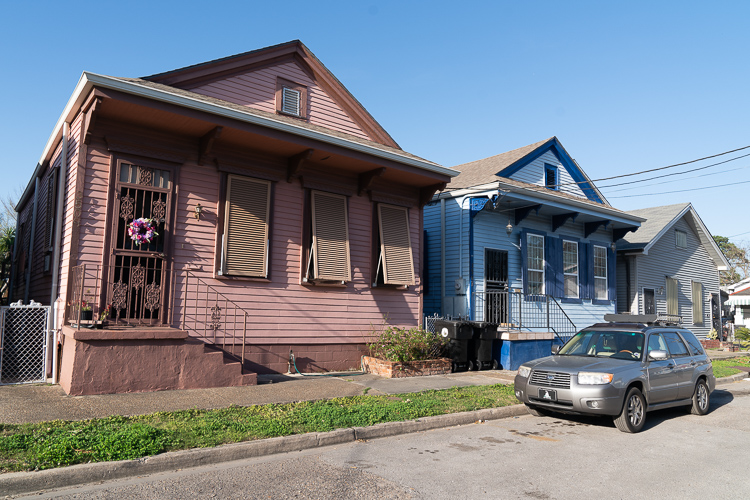
But OK, let's go back. So I think afterwards, when I said this at this meeting, and I realized I'm sitting with a lot of heads of departments. I'm being very contrarian. There is an acceptance of this contrarian nature, but there's also kind of this, I can tell that it's not very common. There was only one other student there, who was a White PhD student. And afterwards, she stayed and talked to me. And she said, Thank you for saying those things. And I said, Why? Why thank you? She said, Well, last year, I was the emcee. And I felt very uncomfortable, because I was in my Whiteness, but you know, they asked me to do it. And it seemed like they were just trying to cherry pick people of color to just stick on the stage. And I said, this has to make you more uncomfortable. I said, I live uncomfortable here. I've been trained to understand this uncomfortable as just a natural part of being in academia. I said, I'm sick of being the only person of color at the table. I'm not going to have that anymore if I'm at the school. And I'm going to make you all very uncomfortable all the time, until we are all uncomfortable about the fact that I'm the only person of color here. Always. She was just like, Yeah, it's very true. It's just that sometimes these are all my professors. I was like, which is exactly why you need to say something. These are your professors, your ideas that you're putting forward. Don't think that that's going to mark who you are. You work with politics and land rights. That's a rebellious concept. You're going to just study it, are you gonna do it? No, you're right, we need to start thinking about these things. And I started just realizing that how many times I've done that this year, like, just speaking up and just saying things that are very natural to everyone there. But nobody wants to say it. And I realized that within the Tulane Community now with this community that I'm slowly constructing in terms of my research, and professors who are willing to advise me and help me with that. Though most of my cohort is trying to conform in every way possible to be pleasing to their professors, that it's going to be my role within this community to disrupt and interrupt these processes. And that I'm going to have to get really used to that. If I want to be integral to myself. Q: Do you think that the faculty are objecting to what you're doing or saying? It sounds like they actually want it. Diane: They are happy when somebody says that. They're uncomfortable, obviously, because when a lot of times, if you're a group at a table, White people who most easily do things in a certain way, like it's not the easiest thing right now to go find actual Black Brazilians to be at an event, because there aren't very many in the city. And now you have to do some work. It's not really easy to find people who are not at the table to be at the table. It's not the easiest thing. So they're very comfortable. And all of them, every single person, every head of our department, except the Africana Studies, all of the other heads of the department are White people, all of them. Even the languages. They're all Americans, you couldn't find a native Portuguese speaker, not one. You couldn't find a native French or Spanish speaker. How is that possible? How do you justify this every day? And like, those are the things that I think they're very comfortable with. They're very comfortable like, "I worked very hard. And I've gotten to this place. And so I deserve this. And so I don't need anyone threatening that." So there's a part of them that's very scared when I do these things, but there's a part of them that's also like, "Yeah, we're not American Studies. This is interdisciplinary, we should be more revolutionary." So I think it's both. I think naturally, a lot of people, as academics have this revolutionary side, because we're thinking about it. We think, and we theorize. But I think at the same time, we're also people who are like, "Shit, but I need to make sure that I have grant money. And I need to make sure that I keep this, and the market is really difficult." And I understand that too. Because it's hard to give up something for somebody else when you feel like you've worked for it. And even at this event, they were talking about like, "Oh, well, we should know, we're going to have a performance," and one of the women goes, "Well, Diane, do you want to perform?" I said, "I don't think this is my space yet. You know, I don't think I deserve that just because I'm here." Like, yes, I want this to be relevant to the actual event. And so I'm convenient. But that's not the point right now, like I'm not the point right now. And I don't want to take somebody else's money that is way more relevant to this event, and to what we're supposed to be doing. So in terms of the Tulane communities that I've constructed, that I've been entering in, I feel really happy about how I've been accepting way more this role of like, interrupter, a little bit of rabble rouser, but in a very respectful way. But just to understand, okay, if that's going to be my role, let's do that as best as possible. And let's do that. |
![]()
I feel like I used to be way more emotional about interrupting in terms of systemic interruptions. And it would get me a bit more in trouble because I would be connected to it in a very emotional way. And now I feel like, I'm way more objective about being able to say, "Okay, we have this positive ability within this possibility. What can we do to make this better, to make this space more accessible, to make what we do more relevant?" And what has really helped me in that regard is the other community that I participate in at Tulane, is I work with Carolyn [Barber-Pierre], who is the Vice President of Student Affairs. She was the inventor, 25-30 years ago, of the Office of Multicultural Affairs at Tulane. She has almost single-handedly created resources for students of color on this campus. She's been here for 30 years. She's my dance instructor as well. She's the other head of Casa Samba. So I took her dance class at Tulane as well. But she is the other director of Casa Samba with the Brazilian dance troupe. She's African American. She and her family have been interested in Brazil for almost 30 years. They've gone back and forth. They've lived with many Brazilians who have come and lived in their house, they study with them. And they're always connected with the Brazilian community here. There's a substantial community here. There's a lot of Brazilians in Kenner, there's a lot of Brazilians in Metairie. When you have a Brazilian event here, and people come out, it will be like workers, immigrant workers. And there's a lot of upper class Brazilians that came. So you've got a lot of conservative voices of Brazilians here. And then you have those who came, got married, whether for love or whether or not. There's definitely a lot of Brazilians I know who work in construction. And have gotten married or stayed because of that. |
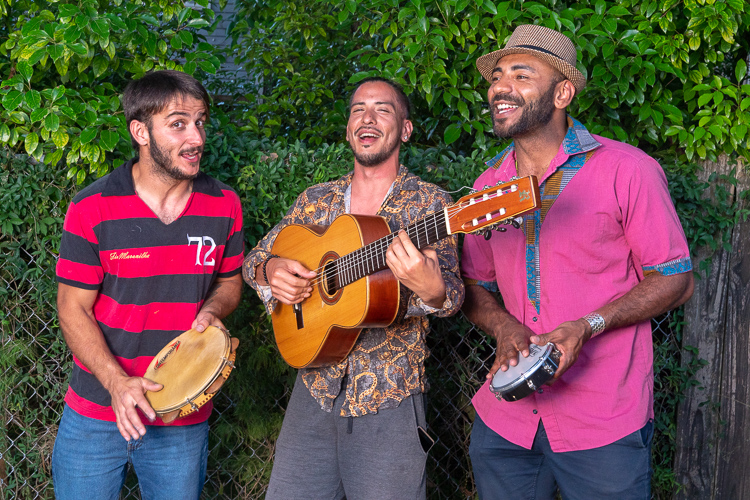
So Casa Samba has always had a lot of connection with the Brazilian community. They do events and when they do events, the Brazilians come out, and they know everybody, and they use their catering for all their events. And there's a lot of Brazilians who also dance with the troupe. Even some Brazilians who are born here are like, "No, this is my connection to my homeland, because I get to do the things that I would be doing back home, but because I'm here." So it's pretty cool. It's interesting, too, because they're not Brazilian. And they're the heads of this cultural pillar that's been around for 20 years. And so they've been going back and forth, literally every year to Brazil, they've lived with their priest. Their spiritual advisor has lived with them for many, many years as well. Now, he's in California, but they're a super interesting group, because they've so focused on learning and respecting the tradition, and respecting Samba. Carolyn's husband makes all the costumes, everything, he does everything. And she teaches all the dances. So I went out and found [Carolyn], and she was so receptive, like, "Okay, well, you can take my class, we dance these days." And they invited me over to the house as soon as I met her husband, and he realized that I speak Portuguese and I've lived in Brazil, he was like, "Oh, come over!" And they've been very intentional about saying, "Hey, we want you to be part of our family." And that has made all the difference. Because working with her during the day, and being able to contribute to an institution that she created, helping with events, sometimes serving food, sometimes teaching yoga to the organizing retreats. That means so much. And then being able to have this person saying, "Yeah, okay, but come over, after dinner, whenever you feel like it, show up. We're here whenever you want. We want you to know that you can count on us." And they have really been the heads of so many things. Like, I respect them, I look up to them. I observe how they build and how they create. And they have been so important to my integration here in New Orleans because they are community builders. At the pure sense of it's literally every day, they are doing something that is related to Brazil. Every single day. So Tuesday, Thursday, Saturday, we have rehearsals, we're there for two to three hours. Monday and Friday he teaches cazuela, the other days there's drumming. There are gigs all the time, these shows. So we're actually paid if we dance at these professional shows. So he's creating an economy for us and we can literally go "Hey, where you at?" "I'm at the house come through." Okay. There it is. Come do this. Come hang out. We made moqueca, we made food, we made this. Come on over everybody. And just someone to sit and talk to, sit and relax with, sit and talk about New Orleans with, to ask for advice. They are my people. They've really been so helpful. And they're going to be part of my life forever. You know, those are the type of people who are, like now I call them Baba and Mama. I remember, one day he grabs me when I was here and I was stressed out and he goes, "I don't think you understand what I'm saying to you. I have a son. I don't have a daughter. And I'd like you to be that." And to have someone so loving around here, even more loving a lot of times in practice than my own family with me. Because my family's a bit more reserved, you know, there's no touching and hugging. And, you know, my life is very different. My life is all about hugs and contact and affection. And it's like, wow, this has changed my life so seriously. And for it to be so intertwined as well with my research, with school, all these parts of my life, I've kind of found this nexus. And it feels really great. Because it feels like there's things that are being synthesized in a way that is productive. And in a way that is allowing me to flourish and, and live out my mission and to actually be productive for other people. And so those are two of my biggest important communities. And then the other community, the neighborhood, which I'll tell you a little bit more about because I've been developing that more. Then Tulane, which is the first community that I had to build. Casa Samba, which is our Samba dance community, which is a group of really diverse women who do a lot of amazing things. We're together all the time, because we're together at least for nine hours a week, generally. And then after that, we hang out. We just went out and danced together last night. We support each other in all of our endeavors. They do events, I'll go to their events, they come to mine, you know, we love each other. The Casa Samba dance troupe is such a commitment, there's been a lot of turnover lately. Because it's like, okay, if you're gonna dance, it's not just going to be dancing. Now you've got to go over it, you got to make your costume, you've gotta be there extra times to do the gigs. And you've got to go on Saturday. And then when they invite you over, and then when you're hanging out. And so people know it's a huge commitment. And it's very core New Orleans, I mean, the Indians, they're the same. The social aid and pleasure clubs. You've got your time and got to, I mean, it's a lot of time and engagement. Engagement, aesthetics, like looking at everything, taking care of everything together and making sure everything is coordinated. It's really cool. But it's also a huge commitment, huge commitment. And then the women are very... there's a very large age range. Some of these women have been dancing with Samba their whole lives, literally, since they were eight, nine years old. So they know the whole culture, they've seen everything happen. And now they're 30. So they've been literally been raising children. And some of us are new, but you know, various of us are from Tulane or from other universities. And then you've also got a lot of just older women to who have been dancing. You know, 40s, 50s, who are great dancers, are amazing, who are like Mothers and Aunties to me. So it's a really beautiful thing. And every practice, everybody gets hugs. Everybody is acknowledged. Everything is straightforward. You know, you mess up the choreography, you mess up something, they're going to tell you, they're gonna say "Nope, you're not doing that right." But it's all love. And it's really, really great. So we do Afro-Brazilian music too, we do play some Samba. And you would see the women dancing it at the show. So yeah, I was initially going to be taken on as a singer, rather than a dancer, to the troupe. But because I've always been kind of incorporated and I've learned to dance and they were like, okay, you can actually do this. |
![]()
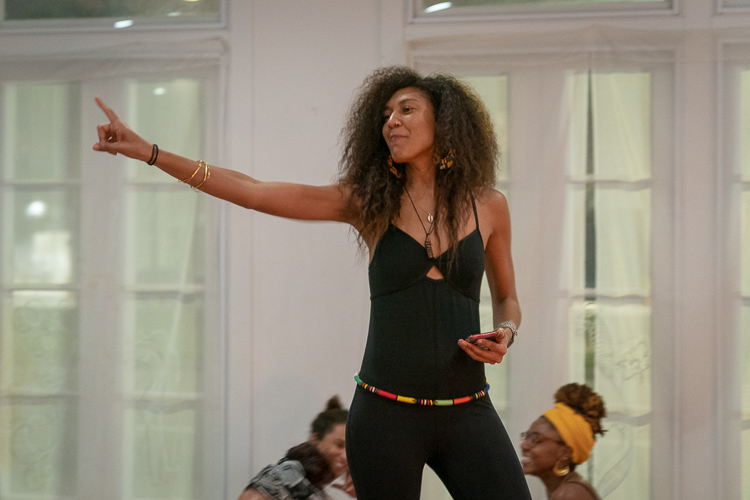
I guess the last community that I can say that is part of like my last official community, I would say is the yoga studio, which you've seen, but the Magnolia Yoga Studio was also a huge part of my establishing myself here in terms of feeling rooted, feeling grounded, having a place to practice yoga. And when I got there, I met some of the people who work there at 100 Yogi's of Color for Social Justice, which was a big event for the head of Dillard. So when I saw there were these four Black yoga teachers sitting at a table and I said, "Excuse me, who are you? Where are you? Where can I find you? How do I get there?" They gave me flyers, you know, I gave them my card. And they were like, "ooh, what do you do?" And I said, "Oh, yeah, this is my work. But I'm looking for places." They said, "we'll come to the studio, maybe you can work there someday." I said, "Okay, we'll see." Like, really cool, calm. They said "we're having a special $30 for 30 days." So I literally went the next day, I started with another friend of mine from Tulane. And we started going every day. And the very important thing about the co studios you saw, it's a very different place than many of the studios I've ever been to. First, it's Black female owned. And I think even just the idea of it being Black female owned, already gives Black women a sense of community because we're constantly having to create things to protect ourselves and to exist in the society. Apart from the ancestor-ality of, this is what we do. We're used to creating communities. I just think that if anybody understands diversity, and what actually diversity is, it's a Black woman. Because we bring everybody in, we want everybody to be accepted because we want to be accepted. And so she has a very clear vision. Ajax is from California, right? So she's also a transplant surgeon. She built the studio from the ground up, it was literally built for her in Storyville right next to a really spicy part of the city. Because there are murders, there are there rapes there, there are a lot of things that happen right on that corner. And, you know, she said at first when she opened the studio she was teaching every single class. And it's been three years now. And they have an app where you sign in, you know, there's monthly events, there are community building activities. She is always trying to incorporate more members of the community. She lets people who have been exonerated, who were formerly incarcerated come and practice yoga for free whenever they want. She's trying to get the service workers program because most of the people who work in that neighborhood are service industry people, so she's trying to get them scholarships through the city, probably with LaToya, right? Try to get them into the yoga studios to have it paid for. So she's really doing something incredible and completely revolutionary. This is a place where 80% of the people who practice are Black women, this is a place where you go in the locker room, and everybody starts talking about what they're doing and what events they're planning. And they give you a business card. And many of them are doing such amazing things. It's a place where you have such a range of ages, such a range of social classes, and everybody's in there sweating, they get out, we all exchange, we come together for events. And it is exactly the way that I would love to run any space, the way that she does it. And so I remember at the beginning that people would first meet me were like, "Well, have you asked about giving workshops here?" And I was like, "No, not yet. Like, I need to understand this place first. I need to watch, I need to listen, I need to see, I need to observe how she teaches, what she looks for, whether I can actually be useful here. Can I contribute? Is this the right place to contribute?" And so I waited until, like two months ago to talk to her about my other work. I would go I'd be there all the time. And then eventually I was like, "Okay, so by the way, I do this, I've been doing this for many years. If it's something that you were interested in, you know, I really respect you, I respect this place. I would love to contribute to this place, I would love to work with you in the long run. Please just think about it." Literally that day, because of the way that I approached her and because she had watched me and observed me, she did not ask me for anything. She did not ask me to prove or show her demo. She just says, "Oh, that's great. Let's start this month." And that, to me, shows I have a true leader. She knew just by the way that I carry myself and how I run things and the way that I'm talking to people that she was gonna be able to trust me to put on something that she could put her name behind, because after all this, this is her studio. And she told me later, she said, "You know, people come to me all the time, asking for shit, wanting to do shit here. And most the time they run something by me and I'm like, nope, because I know that I'm gonna have to take it on, I'm not the one that's really putting the energy behind it." This is the first event where she said, "Well, what do you need?" Then I said, "I need you to participate. I don't want you to do anything. I need you to relax. I've done this a million times." Okay, great. She was so excited to be able to actually relax within her own studio, because usually just upon everything, she was like, I can't believe that this is the first time I feel like I can just let somebody else do something. You know, there was no interaction, she saw, she was there, she was there participating. |

Q: And it struck me. Half the time I saw her, she was there with her eyes closed, taking it in. Diane: And it was just such a proud moment for me. Because for somebody that I look up to. She's a bit older than I am. And we've had some similar paths in terms of, you know, we've both lived around the world, she speaks multiple languages, she was an anthropologist as well, she was an educator, we've had very similar things. And so I look up to her as a business owner, as somebody who is a community change maker. And I said, "Wow, okay, great. But I'm actually contributing here, I'm not a burden here. And that means I can really feel that I'm part of this team, I'm ready now." And that means I invest in this, I bring everybody there, when they come, anybody who visits, anybody who talks to me, you're going to know where I practice yoga, and I'm going to tell you to go, and I'm going to tell you to try it out. And if you don't like it, you don't like it. But this is a different type of vibe: see if you like it, see if you can see yourself here. I do that really unequivocally all the time, because I'm very confident about the space that is created there. And I have a strong personality as well. But I'm also very observant first. And so I can strategically know when to assert myself and when it's time to be quiet, and when to just allow other people to have the floor, the opinion, to be right, whatever. |
![]()
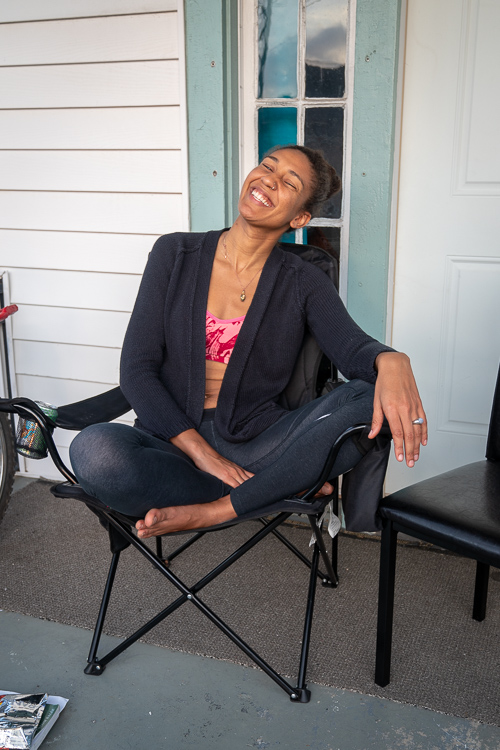
And so that has been the other place. And then I just think that the last thing I could say really about being established here in this neighborhood is more recently, I've been doing more work to really go out and know the neighbors. So if anybody sitting on their porch and I don't know them, I go and I talk to them. And they're very receptive. And they're very happy that I'm here. And so I went to look at another apartment down the street. And the other neighbors are on the porch. And they're like, "Hey!" I introduced myself to ones I don't know. And I said "I'm looking at this place for my friend, I live right down there." And they're like, "yeah, we know. Good, who's your friend?" I was like, "Well, she's another master's student from Atlanta." "Oh, good. Get her in here." And I was like, "interesting." And they were like "Yeah, because he's been showing this house to some real ghetto ass people. We don't want them in here. We want you and your friends here." And I was like, whoa, this is really interesting to reflect on the fact that, first of all, I am being observed, of course, because I'm a new entity in the space. But second of all, that they're like, we see you out there, you're always on the go, you're always working. They're observing the fact that I'm a productive member of their community, and that I'm friendly. And they were like "you're always smiling on your bike. And so I want to introduce you to my daughter!" So I started becoming the massage therapist for one of them. The other woman who's down the street introduced me to her daughter, and she said, "Oh, you're a massage therapist, I really need that. I had these surgeries." Q: When you do that, do you go ahead and charge? Diane: So that's interesting. So the first one is the owner of all these houses. Yeah, I charge him. Because he has money. He's also a massage therapist. So at first I was like, "Well, do you want to do an exchange?" And he was like, "No, no, I want to pay you." Because he understands, he appreciates what I do. So then for the neighbors, I do charge, but I what I tell people, especially the neighbors, I sat down because their daughter works a lot. She works at like a hotel, in the French Quarter. And she's got a daughter, and her mom helps with the daughter. And so I said "Look, generally my prices are high. I'm going to be very honest with you. I charge a lot for what I do. But I know people are satisfied with me. However, I have a different approach when it comes to people who are part of my community, I have a sliding scale. And that sliding scale is based on what you think you can afford, and where those things interact. For me, as a neighbor, it's better for me that you are in better health. Because this is part of my mission being here. You as somebody who's helping out your daughter, you as somebody who is helping out as a pillar of this community is that, so if you want to come see me, you can see me whenever you want. And we'll figure it out. But I'm never going to ask you more or less. And what you say is just as long as you know that I'm a student, this is part of my livelihood, and that you all will contribute as you can." And she's great. She's like "after Mardi Gras, cause, you know, we'll get that together." But I feel very strongly about that. I don't charge the same rates to everybody. And I give everybody the opportunity to know that I don't charge the same rates. I don't lie about it. I don't hide it. I say, look, this is my sliding scale, you know, which side of the scale you on? And I think the thing is, a lot of times, there's this middle class sprinkle that says, "Oh, let me help you." I don't believe in that. Because I think that's really condescending. There's money here in this neighborhood, these people work hard. And they spend money. You're going to spend money on booze, you got to spend money on food. You can't spend money on your health, especially if it's coming back into your community. So for me, I remember when I was working in Buenos Aires and I was working with my dance instructor who's from Brazil, and I was organizing his seminars. And I used to work in the hood, in Buenos Aires and I would teach photography, and I did that for free. And I'd teach kids, I'd teach yoga, photography. And I said, "maybe we could do some dance seminars there." And he said, "Yeah, cool." I was like, "Well, let me see if I can find funding for it." He said, "Let the people fund it." He said, "Look, these people got money, they got money to drink, they got money. Even if it's five pesos, if it's 10 pesos, whatever it is, just so that you know that when you're coming here, I'm contributing something, you're contributing something and your presence is here. But know that I'm not just giving you something, because I feel bad for you." So for me, in all my situations here, I either arranged for exchanges. You know, if you're somebody who really is like, I just financially can't do it right now. Cool, what do you got? You know how to cook? You know, what do you do? Let's see what we can do. And that's how I like to be treated as well, as a human, that I have something to offer you and that I'm not just, you know, you feel bad for me. So you're going to hand something to me. Oh, we all have things to offer, in a way. Charging is also empowering someone to say, "Look, money is energy as well." I'm putting my energy here. So you're going to be a certain type of energy, there's many types of energy we can give. And so that lately, it's been making me really happy to be able to interact and sit and hang out with the neighbors. |
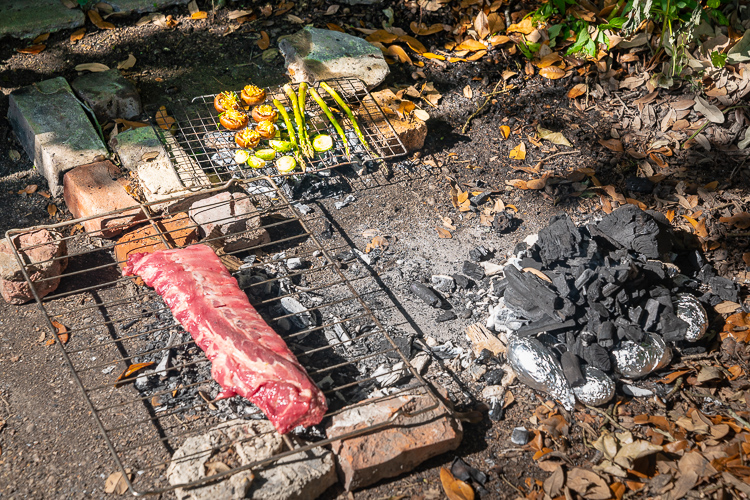
And I'm trying to take more time, you know, I know this is the first year, and so it's been very intense, and knowing myself, it'll get more intense, but I'm gonna take way more time to be more reflexive, because, you know, I just did that, or, Oh, I had dreamed of that, and I did it – it happens so much to me that I don't enjoy it sometimes, like I don't know that I don't enjoy it, because I always enjoy it, but it's like I don't respect it, or I don't think about, I don't reflect on it, and then I'm like, oh, yeah. Like, I just did a million things that I had always dreamed of doing, and maybe I should give myself more love and credit for that, rather than always worrying about how much more needs to be done. Q: I think the people you've been telling me about, it's like they're wonderful models for you, because they've navigated certain… Diane: Pathways, yeah, and they… Q: Didn't necessarily know what they were doing as they were doing it. So you can begin to build on it the way that your faculty couple has built on something they love for 30 years. And it was a building process that you're more and more in a position of being able to do. Diane: And they said that to me as soon as I got here. He said, Diane, the reason that I'm putting so much energy into you is because I know if we work together, you're never going to leave this city, because we're going to do some incredible things, right? So I just want you to know that. I want you to understand that Q: Because they've done a wonderful job of combining several things for themselves. Diane: Yep, they have their life that they want. They've built it and it might not be the most glamorous thing every day, but he said, I don't get up thinking, Oh, I've got to go to work. Every day I do what I want. I'm like, Yeah, that's what I want. And another person who's been a huge mentor, and more and more every day, is one of my other professors who is a young Afro Latina. She dances at Casaba. She is an incredibly vibrant person. She works on music, sexuality, race, anthropology, and she is just, she just bought her apartment. We go out every weekend. She's living her life in such a beautiful way that I look up to it and I see it and I say, oh, maybe all academics aren't so bad, you know? Oh, okay, I can actually see myself in your life, and we actually see ourselves in each other, and we've both been reflecting upon each other, because she takes my courses and I took hers, and you know when she writes me comments on my papers, I'm like, thank you so much for your critique. Thank you so much for putting time into this. And then she comes to my workshop yesterday, and after she got out, she's just like, girl, you just changed my life right now. Like, this is exactly what I needed. And she's like, You know what you've made me realize is about my community building here, I need to build more communities here, and that's just such an honor to be in some of these people's lives. And so I have these moments of realization sometimes where I'm like, Yay, this is great. Makes me happy. |
![]()
Diane left New Orleans about a year after these interviews. She traveled to Latin America, Europe, and Africa, and eventually settled in Kenya. In 2021, she announced that she had finished her Master's degree from Tulane and that she had endured Covid and malaria, but was now feeling very strong. In the following years, she remained based in Kenya, leading spiritual sessions, especially based on ceremonial cacao; and she travels to equatorial forests to learn how cacao is harvested and prepared. She also continues to travel widely, learning and conducting spiritual and yoga sessions - and she continues to maintain her ties to New Orleans and visits her communities in the city. |